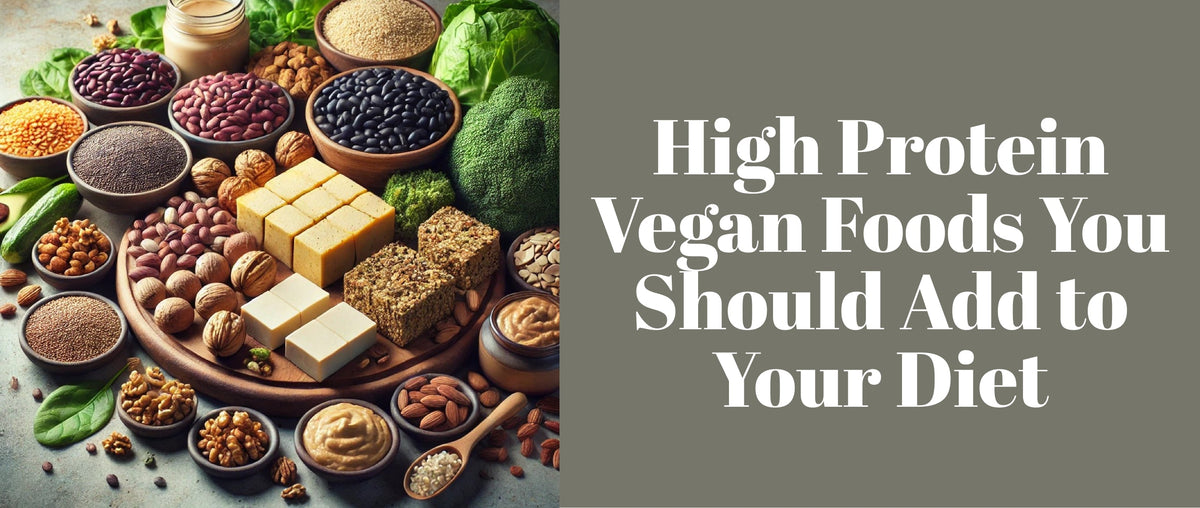High Protein Vegan Foods You Should Add to Your Diet
A vegan diet offers numerous health benefits, including better heart health, improved digestion, and weight management. However, one of the biggest concerns for those transitioning to plant-based eating is getting enough protein. Many people believe that animal products are the only reliable sources of protein, but this is far from the truth.
Several high-protein vegan foods provide all the essential amino acids required for muscle growth, energy, and overall well-being. Whether you're an athlete, a fitness enthusiast, or simply looking to maintain a balanced diet, you can easily meet your protein requirements by incorporating a variety of plant-based sources into your meals.
Understanding Protein Needs in a Vegan Diet
Protein is a vital macronutrient that plays a crucial role in muscle repair, immune function, and enzyme production. While animal products contain all nine essential amino acids, several vegan products also provide complete proteins when consumed in the right combinations.
How Much Protein Do You Need?
| Group | Recommended Daily Protein Intake |
|---|---|
| Sedentary Adults | 0.8g per kg of body weight |
| Athletes & Bodybuilders | 1.2g - 2.0g per kg of body weight |
| Pregnant & Nursing Women | 1.1g per kg of body weight |

Top High-Protein Vegan Foods You Must Include
Legumes & Beans (Plant-Based Protein Powerhouses)
- Lentils – 18g protein per cup
- Chickpeas – 15g protein per cup
- Black Beans – 15g protein per cup
- Edamame (Soybeans) – 19g protein per cup
How to use: Add them to soups, curries, or make a protein-packed hummus with Cashew butter.
Whole Grains (Protein-Rich Carbs for Energy)
- Quinoa – 8g protein per cup (Complete protein)
- Amaranth & Teff – 9g-10g protein per cup
- Oats – 6g protein per cup
- Brown Rice – 5g protein per cup
How to use: Enjoy Oat milk with oatmeal, or pair brown rice with tofu and vegan butter.
Nuts & Seeds (Nutrient-Dense Protein Sources)
- Hemp Seeds – 10g protein per 3 tbsp
- Chia Seeds – 5g protein per tbsp
- Almonds & Peanuts – 7g protein per ¼ cup
- Pumpkin Seeds – 7g protein per ounce
How to use: Sprinkle chia seeds on smoothies, or spread Cashew butter on toast for a protein-rich snack.
Soy-Based Protein Sources (Best Meat & Dairy Alternatives)
- Tofu – 10g protein per 100g
- Tempeh – 21g protein per 100g
- Soy Milk – 7g protein per cup
How to use: Try a tofu stir-fry with garlic butter, or add Soy milk to your morning smoothie.
Plant-Based Cheese & Dairy Alternatives
- Best mozzarella cheese for pizza – Rich in protein and great for melting.
- Fresh mozzarella – Perfect for salads and sandwiches.
- Unprocessed cheese – A healthier choice compared to processed cheese.
Conclusion: Transitioning to a High-Protein Vegan Diet
Switching to a plant-based diet doesn’t mean sacrificing protein. With the right combination of legumes, grains, nuts, seeds, and soy-based products, anyone can meet their daily protein needs.
Try different vegan products like fat-free butter and unsalted butter to complement your meals.
Explore kombucha India and apple cider vinegar drink for better digestion and gut health.
Enjoy high-protein, cholesterol-free foods that promote long-term well-being.
By including these high-protein vegan foods, you can enjoy a balanced, delicious, and nutritious diet without compromising on taste or health!
Do you enjoy vegan food? We have a list of vegan restaurants in India to help you find delicious options in your area!








